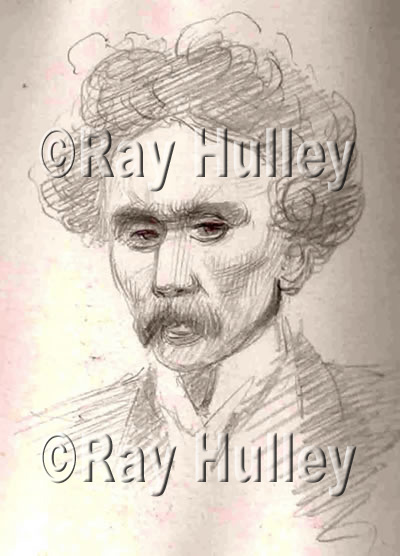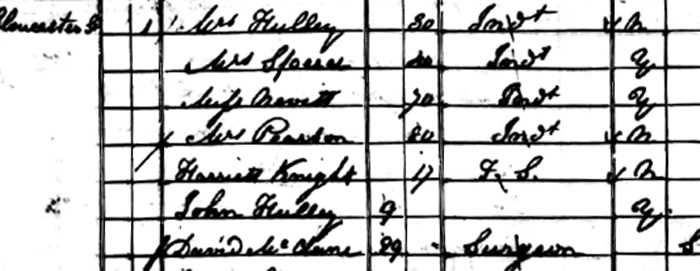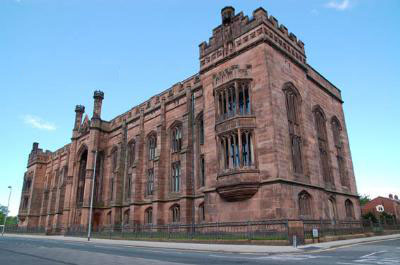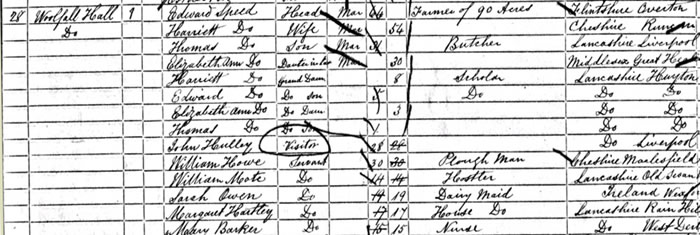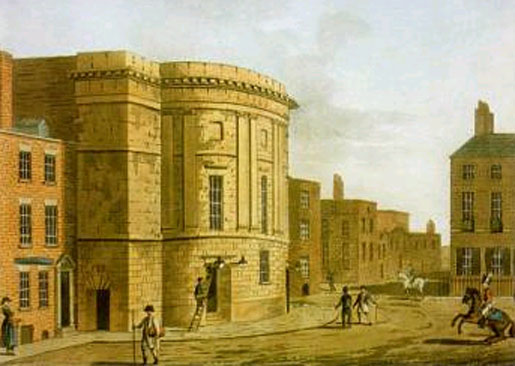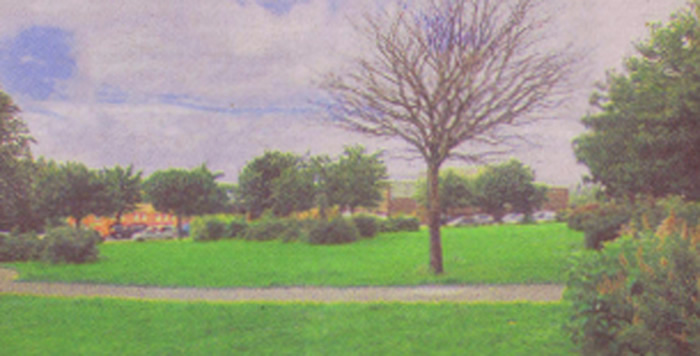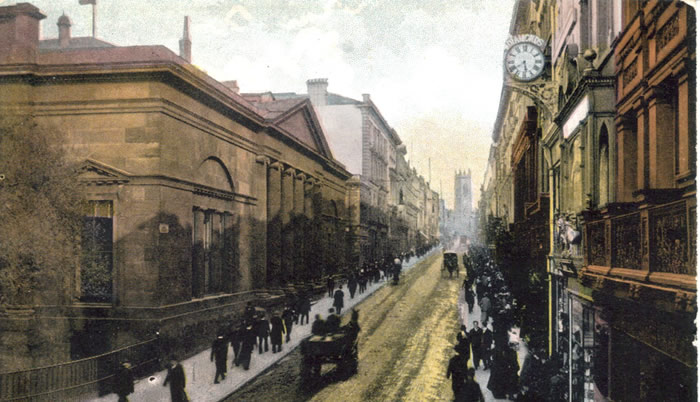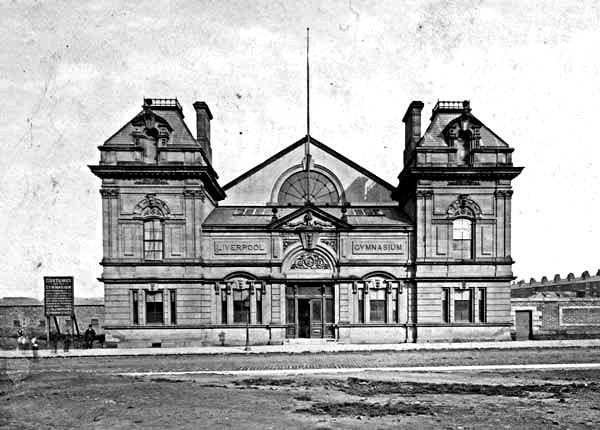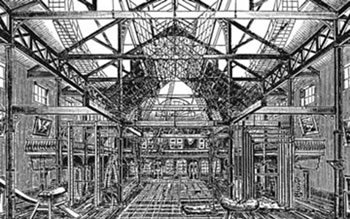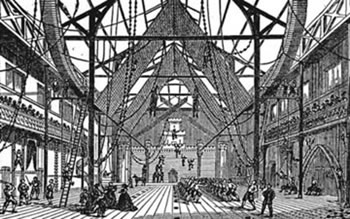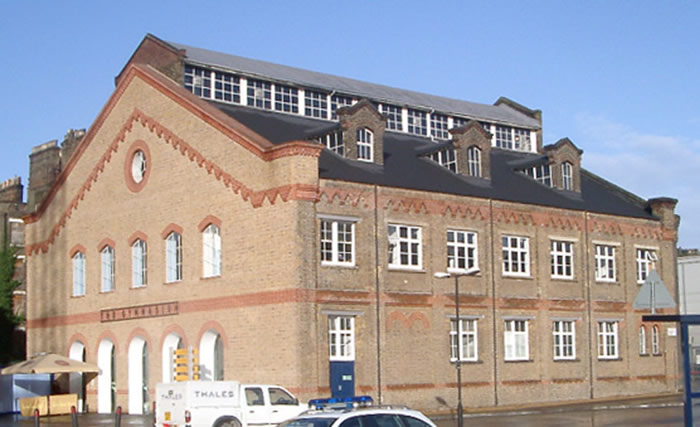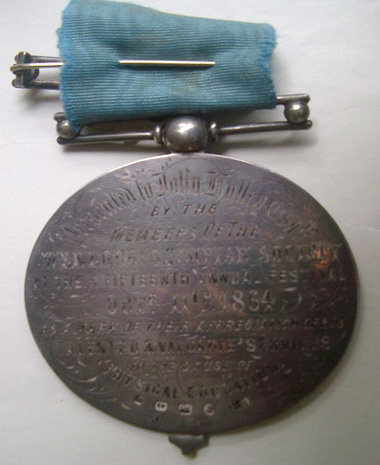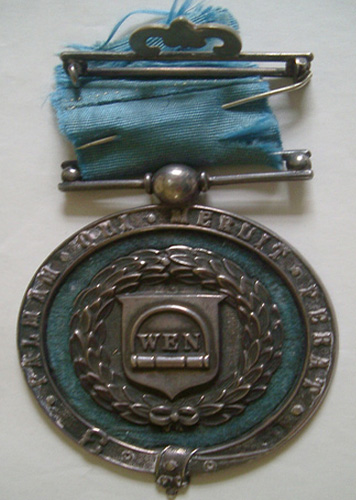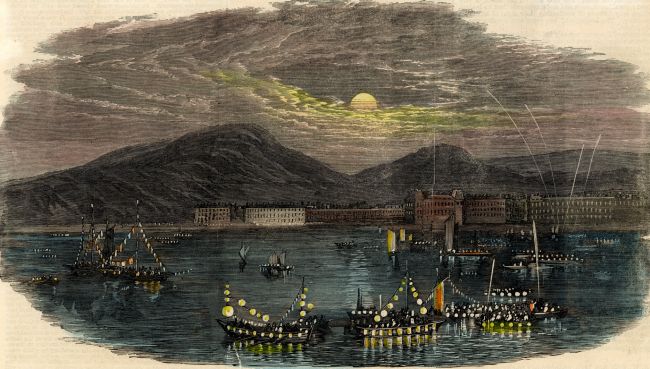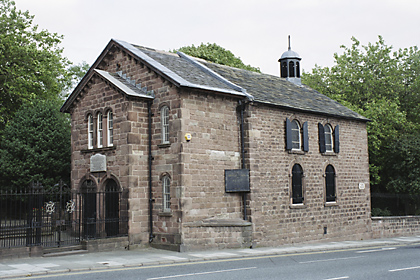By Ray Hulley
|
Introduction This site is a tribute to John Hulley from another Hulley who is a family historian with a special interest in all Hulley families throughout the world. I am a member of the Guild of One-Name Studies and have registered my surname and its variants with the Guild. I respond to enquiries about the surname from researchers in the United Kingdom, the old Commonwealth countries and the United States of America. I have a website at www.hulley.info that contains many Hulley/Hully/Hooley families trees from all these countries, including that of John Hulley. His story has a particular resonance, being the forgotten man of British Olympic history. Consent to use the www.johnhulley-olympics.co.uk URL has been given by the International Olympic Committee, the British Olympic Association and the London Organising Committee of the Olympic Games and Paralympic Games 2012. Please note that all text and images on this web site are copyright © 2009-2021 Ray Hulley. Written permission must be obtained from me if you wish to use any of the material contained herein.
Early days John was born in Liverpool on the 19th of February 1832, son of John Nevitt Hulley and Elizabeth (nee Speed). He was baptised on 19th July 1832 at St David's church, Brownlow Hill, Liverpool by the Revd. Robert Davies, Minister. A copy of the register entry is shown below. In 1841 he was living with his mother and aunt at Gloucester Street Liverpool, his father having died in 1840 at Manchester. (1841 census TNA reference HO 107/558/8 f21.)
From an early age John had a keen interest in physical activities, education and fitness and was taught by Louis Huguenin, the famous Swiss gymnast who had settled in Liverpool in 1844 as a teacher of Gymnastics. Previous to coming to Liverpool he had been following his profession in many other places such as Bristol, Dublin, London,and other towns. He stayed twenty five years in Liverpool as a much appreciated teacher of gymnastics and greatly esteemed fellow townsman. John attended Huguenin’s school in Victoria Buildings, Moorfields, at the top of Lord Street between 1845 and 1850 and matriculated from the Collegiate Institute, Shaw Street Liverpool in c1850. John was destined to be the successor of his teacher who died in 1888. The Liverpool Citizen of 25th February 1888 stated:-
The 1851 census records John and Sarah as visitors staying at Huyton Brook House farm with his uncle Hugh Speed, a wholesale butcher and farmer of 134 acres employing 11 labourers. (TNA reference HO 107/2193 f296r, 297)
The next recorded event in John’s life is a Chancery case dated 1855 between John and Sarah as plaintiffs and his uncle Robert Churchman Hulley and Charles Rowe Cheshire defendants. The latter were executors of the will of Sarah Hulley, spinster aunt of John and Sarah who died in 1845, and was responsible for its disposal, including £200 legacies to John and Sarah who would receive the capital and accumulated interest on their 21st birthdays. R.C Hulley – a rather dubious character - failed to carry out the wishes of his sister Sarah and the case was heard in Chancery. The result is unknown but was probably settled out of court. (Chancery reference C 15/204/H136). The 1861 census held on 7 April shows John Hulley again a visitor at Huyton but this time with another uncle – Edward Speed – at Woolfall Hall farm. (TNA reference RG 9/2741 f45)
Physical Education for the masses John’s interest in physical education had probably been as a result of his connection with Louis Huguenin and he followed this up by becoming the honorary secretary of the Liverpool Athletic Club. He also displayed this publicly by organising an ‘Assault-at-Arms’ at the Theatre Royal Williamson Square on the 25th April 1861. The Liverpool Mercury reported “after an interesting address on the importance of physical education by Mr John Hulley, the honorary secretary, the programme was proceeded with”. Another ‘Grand Assault-at-Arms’ was held at the Theatre Royal Liverpool on the 4th December 1861and John Hulley gave an Essay on Physical Education to the packed audience. Full details of each address are shown in the Speeches and Writings section of this website.
The 1st Grand Olympic Festival in Liverpool was held on 14th June 1862 at the Mount Vernon Parade Ground with 10,000 spectators in attendance. The event was organised by John Hulley, Honorary Secretary of the Liverpool Athletic Club. Mr Melly, addressing the company assembled in front of the grand stand said before they left the ground he thought it was his duty to tell them through whose exertions that delightful afternoon’s amusement had been afforded to them. They were indebted for it to Mr John Hulley, the excellent honorary secretary of the club, and it was entirely owing to his indefatigable and praiseworthy exertions that the festival had been brought to such a successful and highly satisfactory issue. Mr Melly then called for three cheers for Mr Hulley, which were given right heartedly, with "one cheer more."
The Liverpool Mercury reported on 16th June "The committee of management, aided by the indefatigable honorary secretary of the club, Mr. John Hulley, were naturally desirous that the festival should pass off with all possible eclat, and accordingly used their utmost exertions to that end." "It is due to Mr. John Hulley to state that the whole direction and management of the festival devolved upon him. He was unremitting in his exertions throughout the day, and there is no doubt that to his courtesy and zeal the successful issue of the undertaking was mainly attributed." The Rotunda Gymnasium, Bold Street Liverpool
This opened on Monday 6th October 1862 with John Hulley as its Director. The Gymnasium was a quasi-partnership between Samuel Wylde Ackerley and John Hulley, the former supplying the funds in terms of purchase and fitting-out costs to launch the gymnasium; the latter giving practical experience in the gymnasium. Though the premises and fittings cost £6,200, only about £1,200 was actually advanced by Mr Ackerley, the balance of the purchase money being obtained from a building society. It was clearly understood between the two men that Hulley’s practical experience was to be considered as of equal value with Ackerley’s capital and if the property was sold the profit on a transaction should be equally divided between them. In spite of John Hulley seeking a formal deed of partnership this was never brought about, but several weeks after the gymnasium had been established, articles of agreement were forwarded to Hulley for signature. To his surprise, he found that they established a partnership for 18 months only, and that at the expiration of that time Mr Ackerley would be enabled to take the concern entirely into his own hands. The Liverpool Mercury reported that the 2nd Grand Olympic Festival in connection with the Liverpool Athletic Club took place on Saturday 15 June 1863 at the Mount Vernon Parade Ground. Mr Hulley, the indefatigable honorary secretary, and the committee, had used every excursion to render the affair a complete success, and the thousands who were present on Saturday, must admit that this second Olympic Festival was highly successful in every respect. In spite of Hulley’s success with the Liverpool Olympic Festivals, all was not right at the Rotunda Gymnasium. Imagine John Hulley’s surprise and dismay when the following notices appeared in the Liverpool Mercury of 26th December 1863 and 1st January 1864: Rotunda, gymnasium, Bold-Street, No annual subscriptions can be received for the The second ran thus – The New Liverpool Gymnasium, Myrtle Street Clearly John Hulley was stung by this underhand treatment and replied to it through the columns of the Mercury. However, thanks to the support of Mr. C.P. Melly, a Liverpool philanthropist, he was soon back in the physical education arena. Mr. Melly and 10 other eminent Liverpudlians with the Mayor as President formed a company to purchase premises in the town centre suitable as a gymnasium. The Liverpool Mercury of 19 March 1864 reported as follows:
On 9th July 1864 the 3rd Olympic Festival organised by the Liverpool Athletic Club with John Hulley now the Vice-President of the Athletic Society as its Honorary Secretary was held at the Zoological Gardens. It was due to be held on 2nd July but was postponed due to unfavourable weather. The foundation stone of the new Liverpool Gymnasium in Myrtle Street opposite the Philharmonic was laid on 19th July 1864, with a ceremony and presentation of prizes from the 3rd Olympic Festival by the Mayor of Liverpool. He explained that it would be one third larger than the one at King’s Cross London and probably the largest in the world.
John Hulley’s prowess in the field of physical education was formally recognised by the Wenlock Olympian Society on 20th October 1864 when they elected him to honorary membership and awarded him a silver medal in appreciation of his valuable services in the cause of physical education. The medal was re-discovered in 2008 in an attic in Wallasey by a descendant of Georgiana nee Bolton, the wife of John Hulley.
The inscription reads: Presented to John Hulley Esqre The 4th Olympic Festival was held outside Liverpool for the first time at Llandudno on Saturday 22nd July and Monday 24th 1865. John Hulley again organised the festival which included a Grand Procession of Illuminated Boats on the Bay. Unfortunately this had to be postponed from the Saturday evening to the Monday due to the Llandudno boatmen re-hiring their boats to someone else after a price had been agreed with Hulley. At the end of the festival Colonel Walmsley, then rose and said inter alia “The thanks of company were due to Mr Hulley – the thanks of the people of Llandudno were due to him, and he begged that Mr Hulley would accept these thanks through his medium. And he further asked for three cheers for Mr Hulley. The cheers were heartily given, and a cheer for more being added, Mr Hulley addressed a few words to the meeting. The following weeks’ edition of the North Wales Chronicle had this plea to the organisers: The athletic meeting held on the side of the Great Orme is still a favourite topic of conversation in Llandudno and its neighbourhood. It is still remembered with pleasure. Associated with this pleasant recollection are the names of Colonel McCorquodale, Mr Hulley, and Colonel Walmsley. Could not these gentlemen, assisted by any of the visitors or residents now at Llandudno, organise one more such a gathering. They would be doing a kindness to the town, and giving great gratification to both residents and visitors. The former gathering was a numerous one, but a second one would be far more so. We trust Mr Hulley will answer to our appeal. The Liverpool Gymnasium was formally opened on 6th November 1865 by Lord Stanley who was received with applause, and addressed the assembly as follows: -
Included in his remarks was the following tribute to John Hulley: “Of the arrangements I need say nothing. You can judge of them for yourselves, but I congratulate the managers upon having in Mr Hulley, a director, who is working, not merely for the salary which he earns, and which they will be the first to admit is a very inadequate recompense for his labour, but who is working out a very real and enthusiastic interest in the business which he is employed to do. His Lordship concluded by expressing an earnest wish for the success of the institution.” Full details of Lord Stanley’s address are shown in the Speeches and Writings section of this website. On the same day at the Liverpool Gymnasium John Hulley took the Chair on the formation of the National Olympian Association (NOA) and the Liverpool Mercury reported the inaugural meeting with the following persons present:
This meeting was the forerunner of the modern British Olympic Association and was formed mainly through the efforts of John Hulley, Dr. Brookes and Mr Ravenstein – the triumvirate of the 19th century Olympic movement. The link between physical education and the Olympic idea was expressed nicely by John Hulley in 1867. He said ‘What I desire to impress upon you is that Olympic Festivals are not the end of physical education. Physical Education, or rather its dissemination, is the end. Olympian festivals are a means of securing that end.’ The NOA lasted until 1883 and its Olympian Games "were open to all comers". The NOA and its motto were inherited by the National Physical Recreation Society (NPRS) in 1885/1886 and the NPRS was a founder body of the British Olympic Association in l905. Indeed the President and the Treasurer of the NPRS were members of Coubertin's "Comite Brittanique" in l902. So there is a direct link between Hulley's views and aspirations in 1865 and the modern British Olympic movement. Hulley was certainly a tour de force. He began to define Olympism long before the formation of the International Olympic Committee. Like Brookes and Ravenstein he influenced the thinking of the young Coubertin. Another Grand Assault-at-Arms organised by John Hulley was held in the Gymnasium on Thursday evening 8th February 1866 with all profits going to the Children’s Infirmary. Nearly one thousand persons were present to enjoy a varied programme of Gymnastics, Broadsword, Boxing, jumping, wrestling and many other contests. A similar event was held on Wednesday 28th March 1866. The 5th Olympic Festival was again held outside Liverpool at Llandudno on Monday and Tuesday, 25th and 26th June 1866. John Hulley followed this event by organising a swimming fete for juveniles at the same venue on Friday 27th July. He was away from Liverpool during August and September whilst the Gymnasium interior was being decorated. He took the opportunity to visit the principal continental gymnasia to see how they were progressing and to learn possible lessons from them. John Hulley was in attendance at the 1st National Olympian Games held on 31st July at the River Thames at Teddington for aquatic events and on 1st August at the Crystal Palace cricket ground for other events. His presence – and mode of dress - drew considerable attention and a report in the Penny Illustrated Paper mentioned “A turbaned gentleman, attired in the garb of a Turk was supposed to represent the East at the Olympian Festival, but the fancifully-dressed one turned out to be the Gym - wait a minute, I'll spell it directly -- the Gymnasiarch of Liverpool, John Hulley, and whom (as our friend "Old Nicholas” would remark in Fun), no more gorgeously apparelled. In February and March 1867 Assaults-at-Arms were again held at The Liverpool Gymnasium in Myrtle Street although John Hulley was unable to attend the latter due to the death of his sister Sarah on March 28, at the residence of her mother, in Norton-street, Liverpool. The 6th Olympic Festival was held on 28th June 1867 at the Myrtle Street gymnasium continued on 29th June at the Sheil Park Athletic Grounds, Liverpool. John Hulley gave a long speech at the former venue and offered this advice: “What I desire to impress upon you is that Olympic festivals are not the end of physical education. Physical education, or rather its dissemination, is the end. Olympic festivals are the means of securing that end. They must be judged by their after effect, not their immediate results. They are evidence of the good done, but not the whole evidence.” It appears that John Hulley took a back seat in the organisation of this event because the report of this event which included “and the programme was got through very shortly after the appointed time, and this act of itself testifies to the completeness of the arrangements. A better managed Olympic festival has not been held in Liverpool; and this is in great measure due to the exertions of Messrs J.B. Lee and W. D. Hogarth, who, after winning many laurels in the ranks as competitors, this year appeared in the character of joint honorary secretaries.” On 29th August 1867 John Hulley and others responded to the request of the Llandudno townsfolk by organising another Grand Carnival. During the day, as the programme has it, "in order to restore a light on the evening’s amusements, a bazaar for the sale of Chinese lanterns was extemporised on the parade." At a little after 8 p.m., a grand procession of boats, illuminated all over - rigging them astern - with lanterns and coloured fire, was started from the landings steps.
John Hulley's work at the Gymnasium carried on, with a special event being held December 1867. This was a ladies-only display of gymnastics watched by 1,000 ladies and 30 male members of the medical profession in Liverpool. In March 1868 another Assault-at-Arms took place in the Gymnasium but the commercial depression which was prevalent around this period took its toll on the finances of the gymnasium. In their annual report published in November the directors stated that the commercial depression, which existed at the time the last report was issued has continued to prevail, and has seriously militated against the success of the institution. The accounts to 30th September last showed the total receipts to have been £1184 1s 7d, against £1630 4s 3d in 1867, and the expenditure £1298 2s 9d, against £1410 17s 3d in 1867, leaving a loss on the year of £114 1s 2d. With a view to placing the advantages of the institution within the reach of a larger number of persons, the directors reduced the terms for evening membership to one guinea per annum, and they were assured that a large accession of subscribers may in consequence be expected. It is obvious that unless the Gymnasium is appreciated by the public, at any rate to the extent of making it self-supporting, it would be absolutely necessary to close it all together; it is to be hoped, however, that this alternative may be avoided, and that the next season may prove completely successful. The ladies classes continue to give satisfaction, and, it is believed, productive and much good. The directors acknowledged with pleasure Mr Hulley's zeal and welfare of the institution; also the valuable service of Mr. T.W. Read, secretary. The annual grand athletic fete took place on 8th December 1868 at the Gymnasium and there was large and fashionable attendance, showing that a taste for gymnastic exercises was growing at only amongst the youth of the town, but also amongst the fairer sex. Mr W. Rathbone, M. P, presided and in his address said that notwithstanding the discouragement of the past year, he was sanguine as to the future of the establishment, because they had on their side two great powers in the community. First, the medicine men, who were strongly in favour of gymnastics under the judicious and cautious management of Mr Hulley (Hear, hear.) He has seen most wonderful improvements in health, strength, and beauty effected by following out Mr Hulley’s advice. Then a still greater power than the doctors were the ladies, who had warmly taken up the cause of gymnastics (Applause.) I He considered one of the best auguries of the future success of the gymnasium were the ladies’ class. (Hear, hear.) 1869 commenced with England being enthralled with the new-fangled velocipede, and John Hulley immediately recognised the commercial potential of it in relation to exercises and gymnastics. The following piece was published in the Liverpool Mercury of 27th January:
John Hulley helped organise a bicycle race event at Hoylake racecourse on 24 May 1869 but the most talked about event of the summer was the ‘on-off-on’ marriage of John and Georgiana Bolton, daughter of a wealthy local merchant. The Liverpool Mercury of the 16th July initially reported the stark facts ie Marriages - Hulley -- Bolton July 16, at the Ancient Chapel (Unitarian), Toxteth-park, by the Rev Charles Wickstead, B.A., Mr John Hulley to Georgiana Bolton.
This was heavily covered in local and national newspapers and later editions of the Mercury joined in the extremely newsworthy aspect of the event as shown in a separate section which gives details of all the newspaper reports. The Liverpool Gymnasium was re-opened on Saturday 2nd October 1869 for the winter season and John Hulley took the opportunity to make a speech to the members of the gymnasium assembled in lines on the floor of the gymnasium and to the spectators crowded in the galleries. He sent out a message of hope – “The encouraging fact remains that we are making an impression. We have arrived at that stage when we can produce results as well as promises, and point to work done as an earnest of what is to follow. Every member of this gymnasium is in his way a missionary of physical regeneration to his friends and companions -- a missionary who preaches not with words, but with the contagious eloquence of health, activity, and the enjoyment of life.” To newcomers he gave some words of advice – “I would point out one fact which cannot be too strongly impressed on your minds, if you would derive any benefit from your attendance here. It is that physical training -- or physical education, as it is more properly called -- is not entered upon for the purpose of producing a striking muscular development, but the purpose of producing health. The best result of such an education is not seen in an acrobat, a pedestrian, or a boxer, but in a perfectly healthy man.” In the 1871 census John Hulley was living at his house in Grove Street, Liverpool, with his wife Georgiana, their newly born daughter, also Georgiana, his mother and two servants. (TNA reference RG 10/3783 f6.
Changes at The Liverpool Gymnasium This was probably the last speech that John Hulley made in the Gymnasium as its Gymnasiarch, because there was no further mention of him in any newspaper until the 2nd October 1871 edition of the Liverpool Mercury which contained the Inaugural Address of Mr Philip Shrapnell, lessee of the Gymnasium. He delivered his inaugural address to a large number of the members of the Gymnasium, and visitors, who thronged the galleries. Mr Shrapnell entered into possession of the Gymnasium some 12 months ago, not acting as his predecessor had done, as manager of a company, but becoming proprietor himself. His address included the following clue as to the fate of John Hulley: “I need not assure you that I have no desire to depreciate what has been already done, and done well, by my esteemed friend and predecessor, Mr Hulley, when I say that this institution, large as it is and great as its resources are, is far below the point of what ought to be required in such a place at Liverpool.” John Hulley still had a tenuous connection with the gymnasium in the following month because he attended the Assault at Arms on 22nd November, but not as an instructor or Gymnasiarch. Apart from a brief mention in an account of a ‘Soiree Calisthenique’ at the Liverpool Gymnasium on 14th February 1873, John Hulley faded from the public spotlight in Liverpool after being in its full glare for over 12 years. Later reports talk about a trip to North America. He also spent several winters on the continent to avoid the worst of the English winters but in spite of this he decided remain in Liverpool throughout the winter of 1874-75 and unfortunately encountered the very severe weather, which proved fatal to his delicate constitution. He died on 6th January 1875 at his home at 91 Grove street Liverpool aged 42. He was survived by his wife Georgiana and daughter Georgiana Theodosis, and his mother Elizabeth was the informant to his death. Full details of his obituary are shown separately. “We may never see his like again” It is fitting to end this account of the life of John Hulley by reproducing an article written about him 13 year after his death by an unknown old Liverpudlian. The Liverpool Citizen ran a series called ‘Some Old Liverpudlians’ and John Hulley feature in No. 11 of the series published in February 1888. “YES, it is perfectly true that Liverpool, once upon a time, possessed a real live gymnasiarch, and it is equally true that John Hulley was the man. It is a terrible sounding title, with a barbaric smack and just a soupcon of classical Greek; but it certainly existed in the very remarkable person I have named. So far as I am aware, John Hulley must have invested himself with the very formidable title; but I think that it might be asserted, with fear of contradiction, that he was the only gymnasiarch who ever lived and reigned in this country. In the year 1844, a lythe and agile French émigré, named Louis Huguenin settles in Liverpool as a teacher of Gymnastics. To the outside and wondering public he was known as Monsieur, but to his friends and pupils he was only recognisable as Professor Huguenin. Previous to coming to Liverpool, he had been following his profession in many other places, and at various periods he had "practised" in Bristol, Dublin, London, and other towns. In or about 1844, as I have said, the Professor became a naturalised Liverpudlian, and he stayed with us about twenty-five years, as a much appreciated teacher of gymnastics and a greatly esteemed fellow-townsman. During many years Mons. Huguenin's school was held up a court at the top of Lord-street. with an entrance from Cook-street. The teacher's graceful and athletic figure at that time practically illustrated the advantages of his art, and it must be admitted that he proved himself a benefactor to the gilded youths of Liverpool. Many of the existing grave and reverent seigniors of the city were taught to use the dumb-bells by old Louis Huguenin. John Hulley was long the favourite and destined successor of Huguenin. He had previously matriculated at the Collegiate Institution in Shaw-street, and it was at the "College" as it was called, that young Hulley first developed those peculiarities and eccentricities which made him a local notability. Who can forget him in his Highland costume or disporting himself on the steps of the Athenaeum in a suit of velveteen? "How old is Hulley?" inquired Albert Smith of Joe Nightingale, after the latter had introduced him to the future gymnasiarch. "Just turned velveteen" was Joe's witty reply. In due time Huguenin vanished from the scene of his useful labours, and the uncrowned king of the local gymnasts reigned in his stead. From that time, Hulley became a man of mark, and whenever he took his walks or drives abroad he as the observed of all observers and the admired of all admirers. I think he courted and desired public notice and adulation, for he seemed to take great delight in being stared - and laughed - at. He occasionally drove through the streets in the business shandry of a relative who was located at Huyton, and when he did so he was always in picturesque costume. He was a conspicuous and prominent figure at every local fete and festive gathering, and no gals, fancy fair, or public entertainment was complete without him. Many people thought him just a little cracked, but he as a really good fellow at heart, and was as harmless as he was amusing. There certainly was method in his madness, but to my own mind Hulley was always as sane as a lawyer - or an alderman! I have usually regarded professional gymnasts, off the stage, or out of the sawdust ring, as crosses between acrobats and pantomimists, but there was nothing mountebankeish about John Hulley. He and I were intimate and firm friends during many years, and I always fund him most gentlemanly, affectionate, and warm-hearted. I forget his business motto of mens sana &c. (mens insana the local wags used to pronounce it) but I believe John always used it in his prayers , and always boasted that he acted up to it. He had a firm and abiding faith in dumb-bells, clubs, horizontal bars, and the other "properties" of his business, and he regarded the practice of "Jim's-nasty-tricks" as the very noblest work that a man could devote himself to. When political or other local fetes were being celebrated, John Hulley was equally at home in Knowsley Park, on the stage of the Amphitheatre, at Hengler's Circus, or on the sand at Llandudno. At the latter place, in conjunction with his friend Colonel Hugh Molyneaux Walmsley, the son of a noted old Liverpudlian, he once livened up the pleasant town with a torchlight procession of boats. Hulley was also a frequent contributor to the local papers, and in 1867, in collaboration with my old friend and brother Savage, Mr. E.G. Ravenstein, he published "A Handbook of Gymnastics and Reference," a work which is still popular on those subjects. Soon after this time the gymnasiarch in embryo took to foreign travel for the promulgation of his peculiar doctrines, and later he roamed through the backwoods of America, teaching his "noble art" in every village and settlement through which he passed, and driving a whole tribe of Red Indians into the forest by a mere flourish of the huge clubs, which he handled like bulrushes. It was during his career at Liverpool that those arrant humbugs and sham spiritualists, the Davenport Brothers, honoured the town with a professional visit. The cunning charlatans had previously been performing in Manchester, where their "Tom Fool's Knot" was untied and their "mysterious cabinet" secrets were discovered and disclosed by Mr. Henry Irving and Mr. Fred McCabe. in Liverpool, at the Small Concert-room in St. George's Hall, the Davenports were similarly exposed and humiliated by John Hulley and Major "Bob" Cummins. Night after night those plucky Dick Sams confronted the Yankee imposters, and so cleverly and cunningly imitated every trick performed by the showmen that the latter were fairly driven from the town. This plucky achievement greatly increased John Hulley's local popularity. But it was not until the year 1865 that the dream of Hulley's life was fulfilled. Hitherto he had enjoyed a practical monopoly of the local gymnastic business, and, although he was not entirely unopposed, the old Huguenin connection stuck to him, and kept him fully employed. But in 1865 the Myrtle-street Gymnasium was opened, and Hulley was appointed to the proud position of the first and only Gymnasiarch. How well and faithfully he fulfilled the duties of his high office known to scores of his old pupils, and to many of his still surviving friends and acquaintances. When still in the prime of life, and with his faculties and energies unimpaired, the worthy Gymnasiarch of Liverpool was called to that bourne from which no gymnast returns, the local gymnasts broke into loud lamentation over the loss of their beloved leader. The local papers sang paeans of praise over him, and one or two of them, which had ridiculed his harmless eccentricities, wept over the dead gymnasts' bier. John Hulley, professor of gymnastics and Gymnasiarch, is still a pleasant memory in this native city, and his surviving pupils retain an affectionate remembrance of their old teacher. Hulley was born with a mission, which he fulfilled; and, take him for all and all, we may never see his like again.” |
Copyright © 2000-2021 Ray Hulley. All rights reserved.
